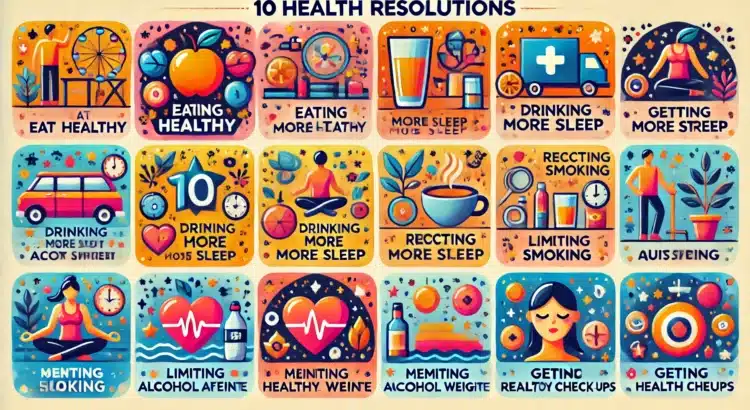As the New Year approaches, many of us are inspired to set resolutions aimed at improving our health and well-being. However, setting realistic and achievable health goals is crucial for long-term success. This article will provide you with ten workable ideas for your New Year health resolutions, each designed to help you lead a healthier and more fulfilling life.
1. Prioritize Regular Exercise
Regular physical activity is essential for maintaining good health. Exercise helps improve cardiovascular health, boost mood, and maintain a healthy weight. To incorporate exercise into your busy schedule, start with small changes like taking the stairs instead of the elevator or going for a walk during lunch breaks. You can also explore various types of exercises such as cardio, strength training, and flexibility exercises to find what you enjoy most.
When setting your fitness goals, consider getting a fitness tracker to monitor your progress. Tracking your activities can help you stay motivated and see tangible results over time. Remember, consistency is key to reaping the benefits of regular exercise.
2. Improve Your Diet
A balanced and nutritious diet is the foundation of good health. Start by incorporating more fruits, vegetables, whole grains, and lean proteins into your meals. Avoid processed foods and sugary drinks, which can lead to weight gain and other health issues. Planning your meals ahead of time can help you make healthier choices and avoid last-minute temptations.
For those looking to make significant dietary changes, it can be helpful to get test results from a healthcare provider to understand any specific nutritional needs or deficiencies you may have. Knowing your body’s requirements can guide your food choices and ensure you’re getting the necessary nutrients.
3. Get Adequate Sleep
Sleep is vital for overall health and well-being. It affects everything from your mood and energy levels to your immune function. Aim for 7-9 hours of quality sleep each night. To improve your sleep quality, establish a consistent bedtime routine, avoid screens before bed, and create a relaxing sleep environment.
Managing stress is also crucial for better sleep. Techniques such as deep breathing exercises, meditation, and reading can help calm your mind before bedtime. Prioritizing sleep can significantly enhance your daily performance and health.
4. Stay Hydrated
Proper hydration is essential for your body to function correctly. Water helps regulate body temperature, transport nutrients, and remove waste. Aim to drink at least 8 glasses of water a day. To increase your daily water intake, carry a water bottle with you, set reminders, and try infused water or herbal teas for variety.
Staying hydrated is especially important if you’re physically active or live in a hot climate. Dehydration can lead to fatigue, headaches, and other health issues. Make hydration a priority in your daily routine to support overall health.
5. Reduce Stress
Stress can have a detrimental impact on both physical and mental health. Chronic stress can lead to anxiety, depression, and various health problems. Implementing stress management techniques such as meditation, mindfulness, and engaging in hobbies can help reduce stress levels.
Taking regular breaks and practicing self-care are also important for stress reduction. Activities like yoga, spending time in nature, and connecting with loved ones can help you unwind and maintain a balanced life. Prioritizing stress management will enhance your overall well-being.
6. Limit Alcohol and Tobacco Use
Excessive alcohol and tobacco use can have serious health consequences, including an increased risk of chronic diseases. Reducing or quitting these substances can significantly improve your health. If you’re struggling to cut back or quit, seek support from healthcare providers or support groups.
Setting specific goals, such as reducing the number of drinks per week or quitting smoking by a certain date, can help you stay on track. Additionally, having a CPR certification can be beneficial in emergencies, especially if you or someone around you is affected by alcohol or tobacco-related health issues.
7. Schedule Regular Health Check-ups
Regular health check-ups are essential for preventive care and early detection of health issues. Schedule routine medical exams and screenings to monitor your health and address any concerns promptly. Keeping track of your appointments and maintaining a record of your health history can help you stay organized.
During check-ups, discuss any new symptoms or changes in your health with your doctor. Regular screenings and tests can help detect conditions early when they are most treatable. Staying proactive about your health will help you maintain a higher quality of life.
8. Focus on Mental Health
Mental health is just as important as physical health. Make it a priority to take care of your mental well-being. Engage in activities that promote mental health, such as therapy, journaling, and practicing gratitude. Building a strong support network of friends, family, and professionals can provide valuable emotional support.
If you experience persistent feelings of sadness, anxiety, or other mental health issues, seek professional help. There are many resources available to support mental health, including counseling services and hotlines. Prioritizing mental health can lead to a more balanced and fulfilling life.
9. Practice Good Hygiene
Maintaining good hygiene is crucial for preventing illnesses and promoting overall health. Simple habits like regular handwashing, oral care, and keeping your living environment clean can make a big difference. Establish a daily hygiene routine that includes brushing and flossing your teeth, washing your hands frequently, and cleaning your home regularly.
Good hygiene practices are especially important during flu season or pandemics. By taking these precautions, you can reduce your risk of infections and maintain better health.
10. Set Specific and Measurable Goals
Setting SMART (Specific, Measurable, Achievable, Relevant, Time-bound) goals can help you achieve your health resolutions. Instead of vague goals like “get fit,” set specific targets such as “exercise for 30 minutes five times a week.” Track your progress and celebrate small victories along the way.
Adjust your goals as needed to stay motivated and on track. Remember that setbacks are normal, and it’s important to stay flexible and committed to your long-term health objectives.
Conclusion
Achieving your New Year health resolutions is possible with realistic and actionable goals. By prioritizing regular exercise, improving your diet, getting adequate sleep, staying hydrated, reducing stress, limiting alcohol and tobacco use, scheduling regular health check-ups, focusing on mental health, practicing good hygiene, and setting specific and measurable goals, you can make significant strides toward a healthier and happier life. Commit to these ten workable ideas and take the first steps toward a better you in the New Year.








